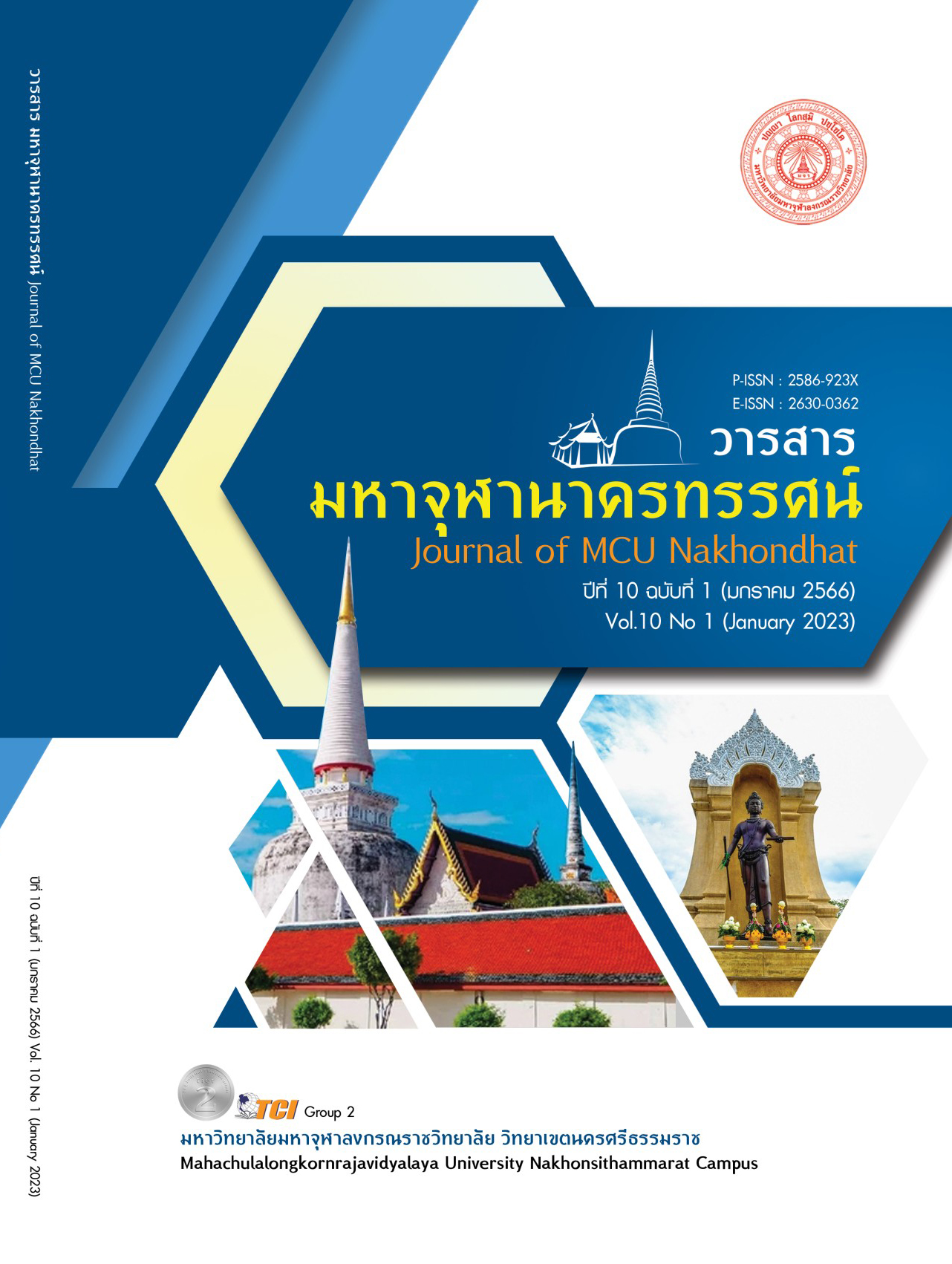EFFECTIVENESS OF MINDFULNESS BASED THERAPY PROGRAM ON THE LEVEL OF DRINKING PROBLEMS AND THE RELAPSE PERIOD OF ALCOHOL DEPENDENCE AT PSYCHIATRIC WARD, NONGBUALAMPHU HOSPITAL
Main Article Content
Abstract
The objectives of this research were to: 1) level of drinking problem of alcohol dependence patients among the experimental group by a Mindfulness Based Therapy Counseling Program (MBTC) and the control group by a Regular Activity Therapy. 2) relapse period of alcohol dependence patients among the experimental group by a MBTC program and the control group by a Regular Activity Therapy, after discharge from the hospital. It was a quasi-experimental research methodology with 2 groups, pre- experiment and post-experiment. A sample of 116 people obtained from the power analysis of sample size, the ratio was 1 to 3, divided into the experimental group treated a MBTC program of 28 people and the control group treated by Regular Activity Therapy of 88 people, totaling 116 people. Which were eligible patients with the assessment scores less than 4 for symptoms of alcohol deprivation, none of psychiatric symptoms or remission that can be able to learn by following up in after treatment in 3 stages were 2 weeks, 4 weeks and 12 weeks. The data were analyzed using baseline statistics, frequency, percentage, mean, standard deviation. Interpretation of results was compared between groups using T-test. The duration of alcohol relapse was analyzed in both groups by Multivariable Flexible Parametric survival regression. The research results were: 1) level of drinking problems pre - experimental period and post-experiment period found that the experimental group had a level of drinking problems. It was statistically significantly different from the control group (p<0.001). 2) The relapse period found that in the 12 weeks, the experimental group was able to reduce the relapse by 99.4%, especially in the first 2 weeks and average 72 days longer than control group to repeat to be an alcohol dependence. The 95 percentage of confidence interval was between 68 and 78 days with statistical significance. (p<0.001).
Article Details

This work is licensed under a Creative Commons Attribution-NonCommercial-NoDerivatives 4.0 International License.
References
กลุ่มงานการพยาบาลจิตเวช โรงพยาบาลหนองบัวลำภู. (2562). รายงานประจำปี 2562 กลุ่มงานการพยาบาลจิตเวช โรงพยาบาลหนองบัวลำภู. เรียกใช้เมื่อ 20 มีนาคม 2565 จาก http://www.nbhospital.go.th/10704nbh/index.php/psychiatry
แพทย์พงษ์ วรพงศ์พิเชษฐ. (2558). การเจริญสติบำบัดภาวะเสพติด. เรียกใช้เมื่อ 20 มีนาคม 2565 จาก https://yutthagos.rta.mi.th/yutthagos-macazine/2558/10-12/007.pdf
ยงยุทธ วงศ์ภิรมย์ศานติ์. (2559). คู่มือสติบำบัดสำหรับการบำบัดผู้ป่วยยาเสพติด [Mindfulness- Based Therapy and Counseling for Relapse Prevention manual]. พิมพ์ครั้งที่ 1. นนทบุรี : บริษัทบียอนด์ พับลิสซิ่ง จำกัด.
สาวิตรี อัษณาวงค์กรชัย. (2562). รายงานสถานการณ์การบริโภคเครื่องดื่มแอลกอฮอล์ในสังคมไทยประจำปีพ.ศ. 2560. กรุงเทพมหานคร: สหมิตรพัฒนาการพิมพ์(1992).
โสภิต นาสืบ และอรทัย วลีวงศ์. (2560). สำนักวิจัยนโยบายสร้างเสริมสุขภาพ (สวน.) ศูนย์วิจัยปัญหาสุรา. เรียกใช้เมื่อ 20 มีนาคม 2565 จาก http://thaincd.com/document/ doc/meeting-seminar/download1no502.pdf
Athirasan K. (2018). The Role of Mindfulness in Treating Addictive Disorders and Rehabilitation.Int J Psychol Behav Anal. Retrieved March 20, 2018, from http://dx.doi.org/10.15344/2455-3867/2018/155
Bowen, S. et. al. (2014). Relative Efficacy of Mindfulness-Based Relapse Prevention. Standard Relapse Prevention and Treatment as Usual for Substance Use Disorders : A Randomized Trail JAMA Psychiatry, 71(5), 547-556.
Carddaciotto L, et. al. (2008). The Assesment of Present-Moment Awareness and Acceptance:The Philadephia Mindfullness Scale. Assessment, 15(2), 204-223.
Coriale et al. (2018). Treatment of alcohol use disorder from a psychological point of view. Rivista Di Psichiatria, 53(3), 141-148.
G. Alan Marlatt. (2558). การเจริญสติสามารถสามารถบำบัดภาวะเสพติดได้ทำให้สมองเกิดการพัฒนาและเปลี่ยนแปลงทั้งในด้านโครงสร้าง. เรียกใช้เมื่อ 23 มีนาคม 2565 จาก https://m.mgronline.com/dhamma/detail/9580000036987
Garland, E. L., & Howard, M. O. (2018). Mindfulness-based treatmentof addiction: Current state of the field and envisioning the next of research. Addiction Science & Clinical Practice, 13(1), 1-14.
Luberto et al. (2013). Mindfulness Skills and Emotion Regulation. the Mediating Role of Coping Self-Efficacy Mindfulness, 5(4), 1-10.
Lyonsa T. et al. (2019). Mindfulness Based Relapse Prevention in Jail Drug Treatment Program. Subst Use Misuse, 54(1), 57-64.
Silpakit, O. (2015). Mindfulness-Based Relapse Prevention Program for Alcoholism: A Case-Control Study. Siriraj Medical Journal, 67(1), 8-13.
Sornla K. (2012). The effect of mindfulness training program on alcohol craving of inpatient alcohol dependence receiving detoxification. In dissertation, Nursing Science (Mental Health Nursing and Psychiatry), Faculty of Nursing. Bangkok: Chulalongkorn University.
United Nations. (2019). Transforming our world:The 2030agenda for sustainable development. Resolution adopted by the General Assembly. Retrieved March 20, 2018, from https://sdgs.un.org/sites/default/files/publications /21252030 Agenda for Sustainable Development web.pdf
Witkiewitz et al. (2019). Advances in the science and treatment of alcohol use disorder. Science Advances, 5(9), 1-11.
World Health Organization. (2019). Global status report on alcohol and health 2018. World Health Organization. Retrieved March 20, 2019, from https:/apps.who.int/iris/bitstream/handle/10665/ 274603/9789241565639 -eng.pdf


